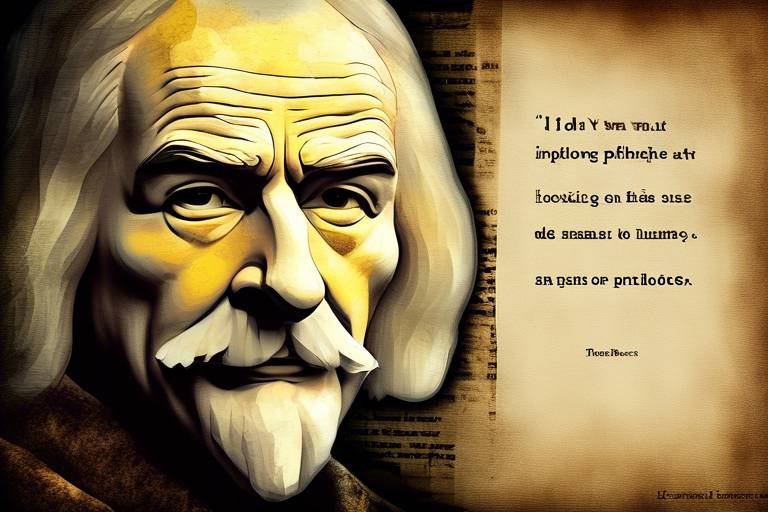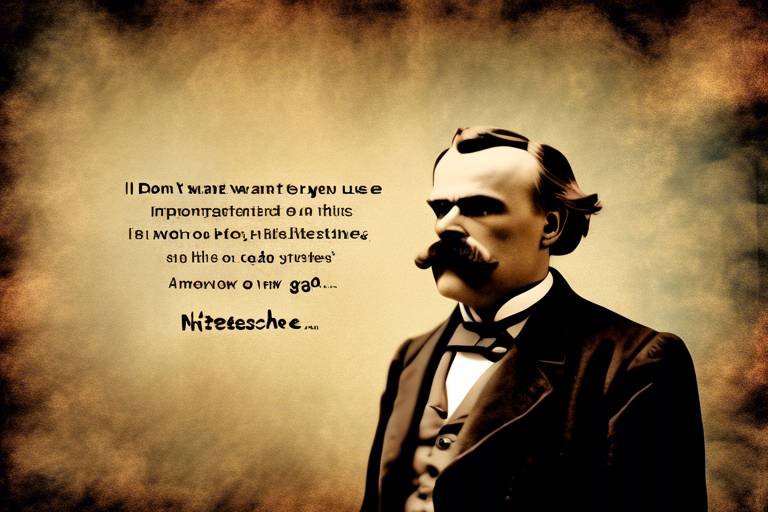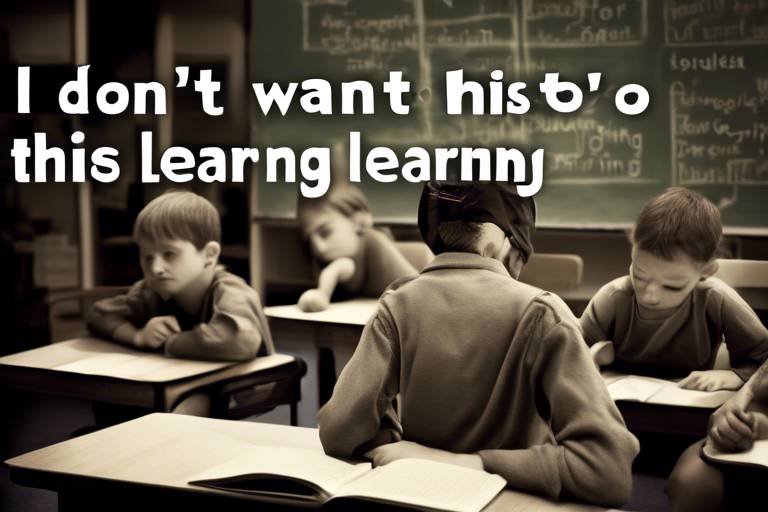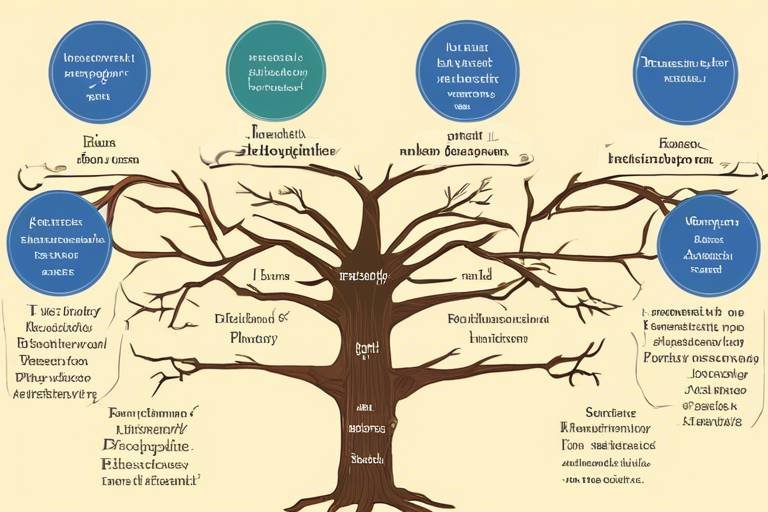Exploring Philosopher Thomas Hobbes's View on Human Nature
Thomas Hobbes, a 17th-century philosopher, is renowned for his profound insights into human nature and the structure of society. His seminal work, Leviathan, lays the foundation for understanding the complexities of human behavior and governance. Hobbes's perspective is not merely academic; it resonates deeply with the struggles and dynamics of contemporary society. In a world where chaos often seems to reign, his theories prompt us to reflect on the nature of humanity and the role of authority in maintaining order.
Hobbes's exploration of human nature begins with a stark observation: humans are driven by their instincts, primarily self-preservation and the pursuit of power. This view is particularly striking in today's context, where individualism and competition are rampant. Imagine a world where everyone acts solely for their own benefit, disregarding the needs and rights of others. It’s a scenario that feels all too familiar, isn't it? Hobbes believed that without a governing body to impose rules and regulations, society would descend into chaos, a state he famously termed the state of nature.
In this state, Hobbes argues, life would be "solitary, poor, nasty, brutish, and short." The absence of a common authority leads to a perpetual struggle for resources, where fear and violence become the norm. This notion raises critical questions about our current societal structure: Are we, at our core, as self-interested as Hobbes suggests? Do we need a strong authority to keep our baser instincts in check? These questions remain relevant as we navigate the complexities of modern life.
Hobbes's solution to the chaos of the state of nature is the concept of the social contract. He posits that individuals willingly come together to form a society, agreeing to surrender some of their freedoms in exchange for security and order. This agreement is not just a theoretical construct; it reflects the reality of how societies function today. We see this in our legal systems and governments, where the authority is derived from the consent of the governed. But what happens when that authority becomes oppressive? How do we balance the need for security with the preservation of individual freedoms? These are the dilemmas that Hobbes's philosophy continues to provoke in modern political discourse.
At the heart of Hobbes's argument is the idea of the Leviathan, a metaphor for a powerful sovereign authority. This figure embodies the necessity of a strong government to maintain order and prevent the anarchy that is inherent in human nature. Hobbes advocates for absolute power in governance, arguing that only a ruler with unchecked authority can effectively manage human conflict and maintain peace. This perspective challenges us to consider the implications of absolute power: Can it ever be justified? What safeguards should be in place to prevent tyranny?
The legitimacy of such authority, according to Hobbes, stems from the consent of the governed. This social contract is a delicate balance of power, where individuals agree to submit to the rule of law for the sake of collective security. However, this notion has faced significant critique. Many argue that Hobbes's view is overly pessimistic, painting humanity as inherently violent and self-serving. Critics question whether such a bleak view of human nature truly reflects our potential for cooperation and altruism.
In conclusion, Thomas Hobbes's exploration of human nature presents a thought-provoking framework for understanding the complexities of society and governance. His insights challenge us to reflect on the nature of authority, the role of individual freedoms, and the ongoing struggle between order and chaos. As we navigate our world, Hobbes's theories remain a crucial lens through which we can examine our own behaviors and the structures that govern us.
- What is Hobbes's view on human nature? Hobbes believed that humans are inherently self-interested and driven by the desire for power and self-preservation.
- What does Hobbes mean by the state of nature? The state of nature is a hypothetical condition where individuals act solely in self-interest, leading to chaos and conflict.
- What is the social contract according to Hobbes? The social contract is an agreement among individuals to form a society, relinquishing some freedoms for security and order provided by a sovereign authority.
- Why is the Leviathan significant in Hobbes's philosophy? The Leviathan symbolizes the need for a powerful sovereign authority to impose order and prevent chaos in society.
- What criticisms does Hobbes's view face? Critics argue that Hobbes's perspective is overly pessimistic and deterministic, neglecting the potential for human cooperation and altruism.

Hobbes's Historical Context
To truly grasp Thomas Hobbes's perspective on human nature, one must first understand the historical context in which he lived. Born in 1588, Hobbes was a product of a turbulent period in English history, characterized by political instability, civil war, and social upheaval. The English Civil War (1642-1651) was a pivotal moment that shaped his thoughts. This conflict, which pitted the monarchy against Parliament, created a landscape rife with fear, chaos, and uncertainty.
Hobbes's experiences during this time were instrumental in forming his views. He witnessed firsthand the destructive potential of human conflict and the fragility of societal order. The war not only led to bloodshed but also to a breakdown of trust among individuals, which made Hobbes question the very essence of human nature. He believed that when left to their own devices, people would revert to a primal state, driven by fear and self-interest.
In Hobbes's view, the absence of a strong, centralized authority would result in a state of nature where life would be "solitary, poor, nasty, brutish, and short." This grim outlook was not merely a reflection of his pessimism but was rooted in the chaotic realities of his time. The political landscape of 17th-century England, marked by the struggle for power and the quest for stability, provided the backdrop against which Hobbes articulated his revolutionary ideas.
Moreover, Hobbes was influenced by the scientific advancements of the era, particularly the works of Galileo and Descartes. The rise of empirical thinking prompted him to apply a scientific approach to human behavior, viewing individuals through the lens of mechanical philosophy. He argued that just as physical objects are governed by laws of nature, so too are humans, driven by desires and aversions.
In summary, understanding Hobbes's historical context is crucial for appreciating his philosophical contributions. His thoughts on human nature were not developed in a vacuum but were a direct response to the tumultuous world around him. This context not only informs his theories but also highlights the relevance of his ideas in contemporary discussions about governance, authority, and morality.

Key Concepts of Hobbes's Philosophy
Thomas Hobbes's philosophy is a fascinating exploration of human nature, societal structures, and the need for governance. At the core of his theories are several key concepts that illuminate his understanding of human behavior and the organization of society. These concepts include the state of nature, the social contract, and the Leviathan. Each of these ideas plays a crucial role in understanding why Hobbes believed a powerful authority was necessary to prevent chaos and maintain order.
Hobbes famously described the state of nature as a hypothetical condition where individuals exist without any form of government or societal structure. In this state, life is characterized by a constant struggle for survival, where every person acts out of self-interest. Imagine a world where everyone is competing for the same resources, leading to a chaotic environment filled with distrust and hostility. Hobbes argued that in such a scenario, there would be no place for morality or justice, as individuals would be solely focused on their own needs. This bleak view of humanity emphasizes the necessity of a governing body to impose order and protect individuals from one another.
Central to Hobbes's philosophy is the idea that humans are inherently self-interested. This means that our actions are primarily driven by our desires for power, resources, and security. As Hobbes puts it, "the life of man, solitary, poor, nasty, brutish, and short." Without societal constraints, individuals would continually compete, leading to a violent existence. This concept raises an intriguing question: if we are all inherently self-interested, can we ever truly act altruistically? Hobbes believed that only under a structured society could individuals begin to cooperate and form meaningful relationships.
In the state of nature, the fear of death and the instinct for self-preservation become dominant forces in human behavior. Hobbes argued that this fear compels individuals to seek power and resources, leading to a perpetual state of conflict. It's like a game of survival where everyone is a competitor, and trust is a rare commodity. The result? A society on the brink of collapse, where the fear of one another outweighs any potential for collaboration. This relentless pursuit of self-preservation creates an environment where violence and conflict become the norm, further highlighting the need for a strong authority to maintain peace.
To escape the chaos of the state of nature, Hobbes proposed the idea of a social contract. This is an implicit agreement among individuals to form a society, where they collectively relinquish some of their freedoms in exchange for security and order provided by a sovereign authority. Picture it as a trade-off: you give up certain rights and liberties with the understanding that you will be protected from the chaos that exists without governance. This concept underlines the importance of societal structures in creating a stable environment where individuals can thrive.
The concept of the Leviathan symbolizes Hobbes's vision of a powerful sovereign authority. He believed that only a strong ruler could effectively manage human conflict and maintain peace. The Leviathan is not just a metaphor; it represents the collective power of the people, who agree to submit to a sovereign in exchange for protection and order. Without this authority, Hobbes feared society would descend into anarchy, where the survival of the fittest reigns supreme.
Hobbes advocated for absolute power in governance, arguing that only an all-powerful ruler could effectively manage the inherent conflicts within human nature. This idea might seem extreme, but Hobbes believed that a strong, centralized authority was essential for the survival of society. The Leviathan must possess the power to enforce laws and maintain order, ensuring that individuals prioritize collective well-being over personal gain. In this view, the ruler acts as a necessary evil, a guardian against the chaos that human nature can unleash.
According to Hobbes, the legitimacy of the sovereign's authority stems from the consent of the governed. Individuals willingly submit to the rule of the Leviathan for the sake of collective security and stability. This notion raises important questions about the relationship between authority and individual freedoms. How much power should a ruler have? And what happens when the sovereign fails to provide the security that individuals seek? These questions continue to resonate in contemporary discussions about governance and the balance between authority and personal liberties.
- What is Hobbes's view on human nature? Hobbes viewed human nature as inherently self-interested, leading to conflict and chaos without a strong governing authority.
- What does the social contract entail? The social contract is an agreement among individuals to form a society, giving up certain freedoms for security and order.
- Why is the Leviathan significant? The Leviathan symbolizes the need for a powerful sovereign authority to maintain order and prevent anarchy.
- What are the critiques of Hobbes's philosophy? Critics argue that Hobbes's views are overly pessimistic and deterministic, sparking debates on individual freedoms versus authority.
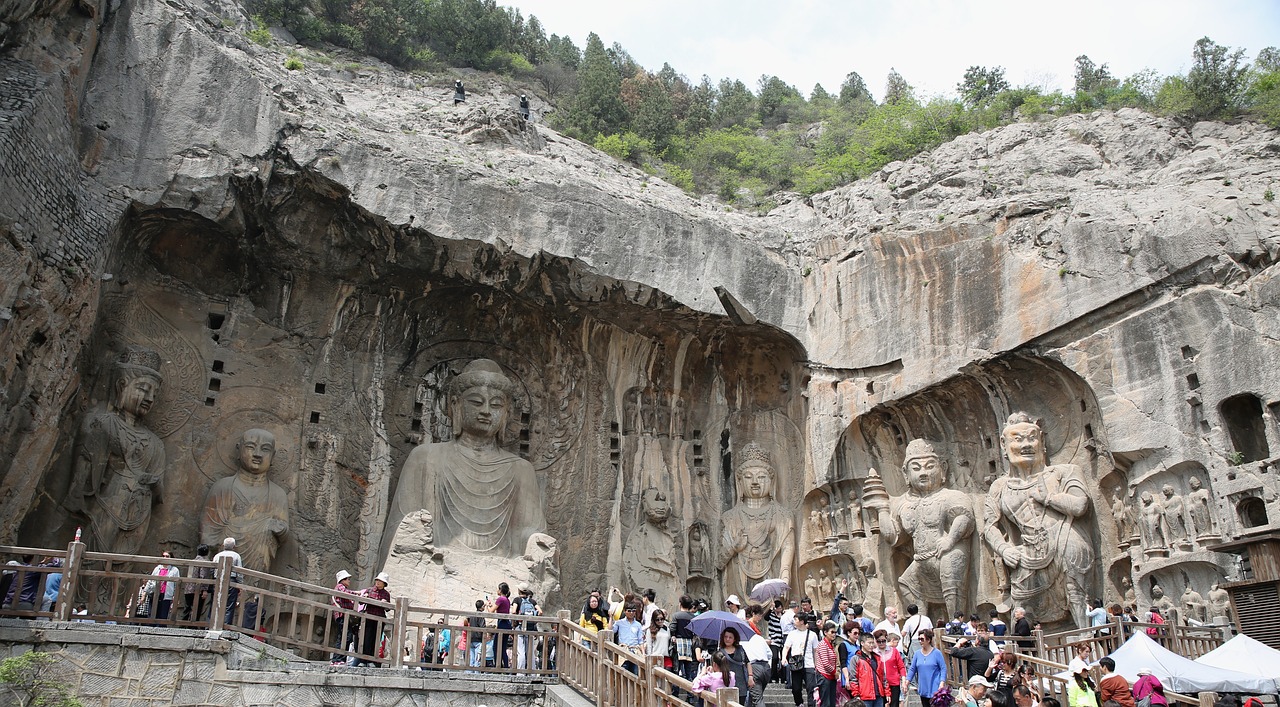
The State of Nature
When we dive into Hobbes's concept of the state of nature, we’re stepping into a world that feels chaotic and raw—like a jungle where the only law is survival of the fittest. Hobbes paints a rather grim picture of humanity's natural state, suggesting that without the constraints of society, individuals are driven by their own self-interest. This self-interest leads to a ruthless competition for resources, power, and safety. Imagine a world where everyone is looking out for number one, where trust is a rare commodity and betrayal lurks around every corner. It’s a scenario that feels more like a dystopian novel than a reality we would want to inhabit.
In this state of nature, Hobbes argues that life is “solitary, poor, nasty, brutish, and short.” This stark description encapsulates the essence of his view: without a governing authority to impose order, human interactions devolve into chaos. The absence of laws means that every individual is left to fend for themselves, leading to a constant state of conflict and fear. Fear of death and the instinct for self-preservation become the primary motivators of human behavior, pushing individuals into a never-ending struggle for dominance and security.
To illustrate this further, consider the following key characteristics of Hobbes's state of nature:
- Self-Interest: Each person acts primarily for their own benefit, often at the expense of others.
- Conflict: With no laws or social contracts, competition for resources leads to inevitable clashes.
- Fear: The constant threat of violence and death drives individuals to seek power and security.
Hobbes’s view suggests that this inherent selfishness and the resulting conflicts necessitate a strong, centralized authority to maintain peace and order. Without such authority, humanity would be trapped in a cycle of violence and distrust, where every individual is a potential enemy. In this light, the state of nature serves as a powerful argument for the creation of a social contract, where individuals agree to relinquish some freedoms in exchange for the security that a sovereign authority can provide.
Ultimately, Hobbes’s state of nature is not just a theoretical construct; it’s a reflection of his deep-seated belief in the darker aspects of human nature. His insights compel us to question the very foundations of our society: What happens when individuals prioritize their own desires over the common good? How do we balance authority with personal freedoms? These questions remain as relevant today as they were in Hobbes's time, making his philosophy an enduring topic of discussion in contemporary political thought.

Human Self-Interest
At the heart of Thomas Hobbes's philosophy lies a fundamental belief in the idea of human self-interest. Hobbes argues that individuals are primarily driven by their own desires and needs, often prioritizing personal gain over the well-being of others. This perspective isn't just a casual observation; it is a cornerstone of his understanding of human behavior and societal dynamics. Imagine a world where everyone is solely focused on their own interests—it's like a chaotic marketplace where no one can trust anyone else, and everyone is out to get the best deal for themselves. This relentless pursuit of self-interest leads to a competitive atmosphere that can easily spiral into conflict.
Hobbes posits that in the absence of a governing authority, this self-interest can manifest in several ways:
- Competition: Individuals compete for resources, power, and recognition, often leading to disputes and violence.
- Distrust: A lack of trust among individuals causes paranoia, making people suspicious of each other's motives.
- Conflict: The inevitable clashes that arise from competing interests create a state of constant unrest.
In essence, Hobbes paints a rather bleak picture of humanity's natural state. He suggests that without a strong societal framework or authority to regulate interactions, human self-interest can lead to a 'war of all against all.' This notion raises an intriguing question: if we are all inherently self-serving, how can we ever hope to live in harmony? Hobbes's answer lies in the establishment of a powerful sovereign—an entity that can impose order and create a sense of security. Thus, while self-interest is a driving force of human behavior, it is also a compelling argument for the necessity of governance and social contracts.
However, it's essential to consider that Hobbes's view might be overly simplistic. While self-interest is undoubtedly a significant factor in human interactions, it does not account for the complexities of human emotions, empathy, and altruism. After all, isn't it also true that people often act against their self-interest for the sake of others? This dichotomy between self-interest and altruism continues to fuel debates in contemporary philosophy and political theory, making Hobbes's ideas both relevant and contentious.

Conflict and Fear
In Hobbes's view, the state of nature is a grim reality where fear reigns supreme. Imagine a world where every individual is pitted against one another, driven by a primal instinct for survival. This scenario is not just a theoretical exercise; it’s a vivid reflection of Hobbes's belief that without a governing authority, humanity is doomed to a life of constant conflict and anxiety. The fear of violent death looms large in this chaotic existence, compelling individuals to act in ways that prioritize their own safety over the well-being of others. It's a bit like being in a jungle where the only law is the survival of the fittest—where trust is scarce, and alliances are temporary.
This fear, according to Hobbes, manifests in several critical ways:
- Desire for Power: Individuals, driven by the fear of losing their lives or possessions, are constantly seeking power. This quest for dominance often results in hostile encounters.
- Competition for Resources: Scarcity breeds conflict. When resources are limited, individuals are more likely to resort to violence to secure what they need for survival.
- Perpetual State of War: Hobbes famously stated that life in the state of nature is "solitary, poor, nasty, brutish, and short." This encapsulates the idea that fear leads to a continuous cycle of aggression and retaliation.
Hobbes argues that this environment of fear and conflict is unsustainable. People, in their quest for self-preservation, become trapped in a vicious cycle where trust is absent, and every interaction is tinged with suspicion. The result? A chaotic society where the strong prey on the weak, and the weak band together out of necessity but remain in a constant state of tension. It’s a grim portrait of humanity that Hobbes paints, and it raises the question: is this truly the essence of human nature, or is there a more optimistic view to consider?
Ultimately, Hobbes's insights into conflict and fear serve as a foundation for his argument in favor of a strong, centralized authority. He believes that only through the establishment of a powerful sovereign can individuals escape this cycle of fear and conflict, paving the way for a more stable and secure society. This brings us to the crucial discussion about the social contract, where individuals willingly surrender some of their freedoms to gain protection from the chaos that fear and conflict create.
- What is the state of nature according to Hobbes? Hobbes describes the state of nature as a condition where individuals act solely out of self-interest, leading to chaos and conflict.
- Why does Hobbes emphasize fear in human interactions? Fear of death and the desire for self-preservation drive individuals to seek power and resources, resulting in conflict.
- How does Hobbes propose to resolve the issues of conflict and fear? He suggests that individuals enter into a social contract, surrendering some freedoms to a sovereign authority for the sake of security and order.
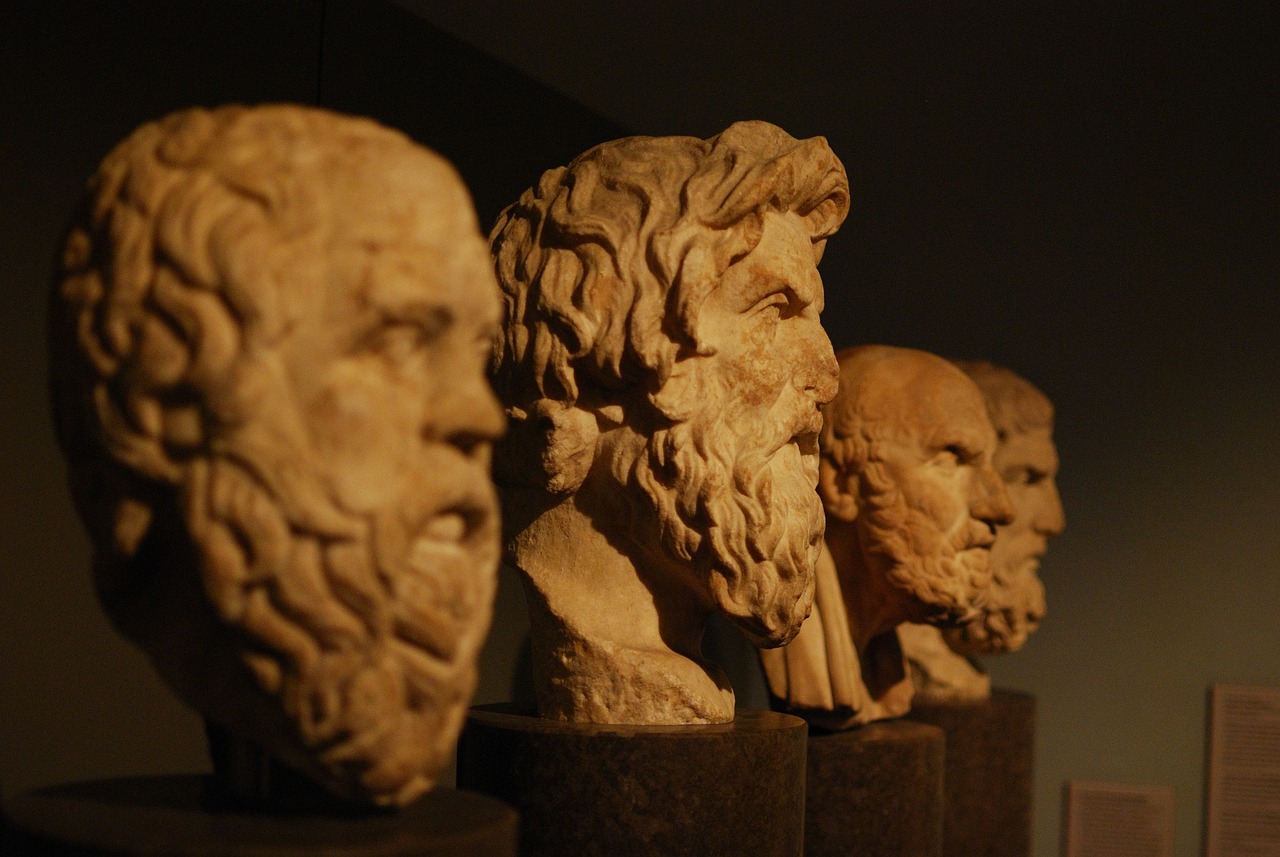
The Social Contract
Thomas Hobbes's concept of the social contract is a cornerstone of his political philosophy, acting as a bridge between the chaotic state of nature and the structured society we know today. In Hobbes's view, the social contract is not merely a theoretical framework; it is a necessary agreement that individuals enter into to escape the brutish existence of life without governance. Imagine a group of people stranded on a deserted island, where survival depends solely on individual prowess and cunning. In such a scenario, trust is scarce, and conflict is inevitable. This is Hobbes's state of nature, where life is "solitary, poor, nasty, brutish, and short." To avoid this grim reality, individuals agree to surrender certain freedoms in exchange for the protection and order provided by a common authority.
But what does this social contract entail? At its core, it is a mutual agreement among individuals to form a society. By relinquishing some personal liberties, people gain the security of living under a sovereign power. This power, often embodied in a monarch or governing body, is granted the authority to enforce laws and maintain peace. In essence, Hobbes argues that the formation of a government is a rational choice made by individuals seeking to enhance their own well-being. The social contract is, therefore, a trade-off: freedom for security, chaos for order.
One of the most fascinating aspects of Hobbes's social contract is its emphasis on the legitimacy of authority. According to Hobbes, the authority of the sovereign is derived from the consent of the governed. This means that even an absolute ruler's power is ultimately rooted in the agreement of the people. It’s akin to a game of trust; players must agree on the rules for the game to function smoothly. If the sovereign fails to provide security or becomes tyrannical, the social contract is effectively broken, and individuals have the right to revolt. However, Hobbes was clear that such revolts should be the last resort, as the chaos of the state of nature is a far worse alternative.
In the grand tapestry of political thought, Hobbes's social contract theory raises critical questions about the balance between authority and individual freedoms. It challenges us to consider: how much freedom are we willing to give up for the sake of security? Are we, as modern citizens, still bound by this social contract with our governments? The implications are significant, especially in today's world where issues of governance, authority, and personal liberties are at the forefront of political discourse.
Ultimately, Hobbes's social contract serves as a powerful reminder of the delicate balance between order and freedom. It invites us to reflect on our own societal agreements and the structures we create to maintain peace and security in our lives. As we navigate the complexities of modern governance, Hobbes's insights remain as relevant as ever, urging us to consider the implications of our choices and the nature of the authority we accept.
- What is the social contract? The social contract is an agreement among individuals to form a society, surrendering some freedoms for security and order provided by a governing authority.
- Why did Hobbes believe in absolute authority? Hobbes believed that only a powerful sovereign could effectively manage human conflict and maintain peace, preventing the chaos of the state of nature.
- How does the social contract relate to modern governance? The social contract raises important questions about the balance between authority and individual freedoms, which are still relevant in contemporary political discussions.

The Leviathan: Sovereignty and Authority
The concept of the Leviathan is not just a metaphor; it's a crucial part of Thomas Hobbes's philosophy that encapsulates his views on governance and human authority. In Hobbes's eyes, the Leviathan represents a powerful sovereign authority, a necessary force to impose order and prevent the chaos that can arise from human nature. Imagine a massive sea creature, representing the state, that demands respect and obedience to maintain peace and security. In a world where individuals act out of self-interest, the Leviathan stands as a bulwark against the anarchy that would otherwise ensue.
Hobbes believed that without a strong, centralized authority, society would devolve into a state of constant conflict and fear. He argued that humans are driven by a fundamental need for security, and this need justifies the establishment of an absolute power. The Leviathan symbolizes this authority, which is not merely a ruler but a collective entity formed by the social contract. The citizens, in their quest for safety and stability, agree to submit to this sovereign power, relinquishing certain freedoms to gain the protection of the state.
In Hobbes's view, the absolute power of the Leviathan is essential for the effective management of human conflict. The sovereign must have the authority to enforce laws, regulate behavior, and maintain order. This absolute power does not imply tyranny; rather, it is a necessary condition for ensuring the survival of society. Without this power, Hobbes argues, the natural state of humanity—characterized by competition, distrust, and violence—would prevail. The Leviathan, therefore, is a necessary evil, a powerful entity that ensures the well-being of the collective.
Furthermore, Hobbes posits that the legitimacy of the Leviathan's authority comes from the consent of the governed. Individuals willingly submit to the rule of the sovereign because they recognize that their safety and stability depend on it. This social contract is not a mere agreement; it's a profound commitment to uphold the authority that protects them from the chaos of the state of nature. In this sense, the Leviathan embodies the collective will of the people, who have chosen to prioritize security over individual freedoms.
However, the balance between authority and individual freedoms remains a contentious issue. Critics of Hobbes argue that his emphasis on absolute power can lead to authoritarianism, where the rights of individuals are overshadowed by the demands of the state. This raises important questions about the nature of governance and the role of the individual in society. Is it possible to maintain order without infringing on personal liberties? Hobbes’s Leviathan serves as a starting point for these discussions, prompting us to explore the delicate interplay between authority and freedom in our own political systems.
In summary, Hobbes's Leviathan is a powerful symbol of sovereignty and authority, emphasizing the need for a strong governing body to maintain order in a world driven by self-interest. The concept encourages us to reflect on the nature of power, legitimacy, and the social contract that binds us together in pursuit of a peaceful society.
- What is the main idea behind Hobbes's Leviathan?
Hobbes's Leviathan represents the necessity of a strong sovereign authority to maintain order and prevent chaos in society. - Why does Hobbes advocate for absolute power?
He believes that only an all-powerful ruler can effectively manage human conflict and ensure societal survival. - How does the Leviathan relate to the social contract?
The Leviathan embodies the collective will of the people who consent to submit to its authority for the sake of security and stability. - What are the critiques of Hobbes's view on authority?
Critics argue that his ideas can lead to authoritarianism and overlook the importance of individual freedoms.
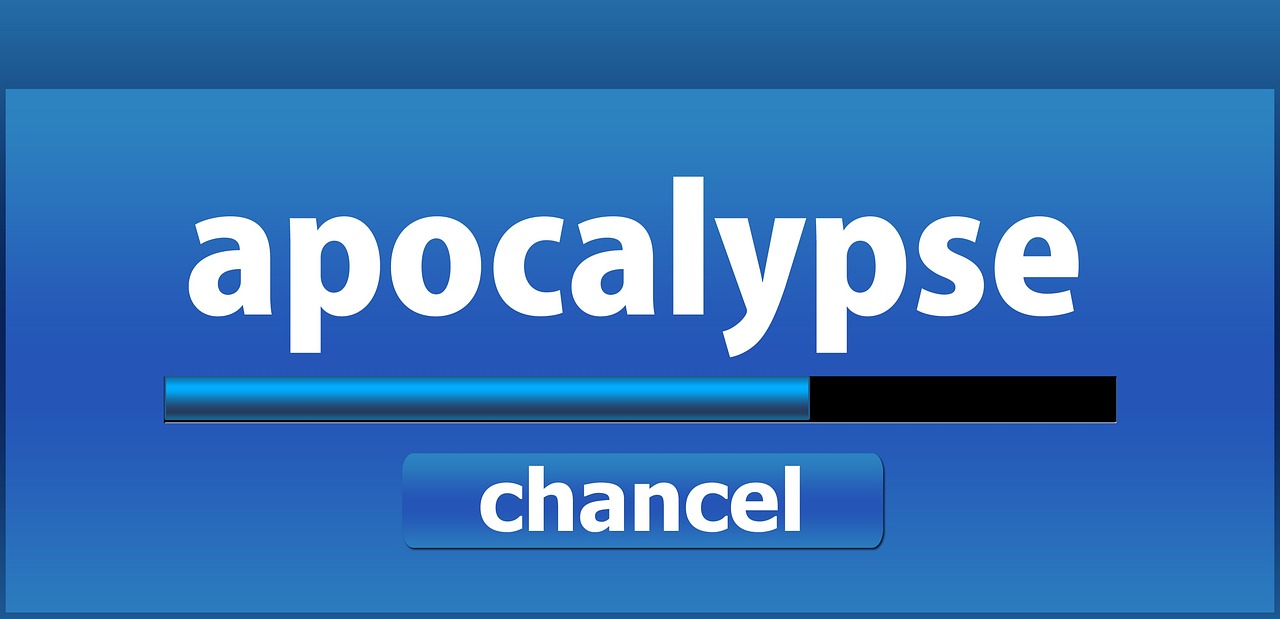
Absolute Power
When we talk about in the context of Thomas Hobbes's philosophy, we dive into a realm where authority is not just a suggestion but a necessity. Hobbes believed that to maintain peace and prevent chaos, a sovereign must wield complete control over the populace. Imagine a ship navigating through a stormy sea; without a captain at the helm, the ship is destined to capsize. In Hobbes's view, the sovereign acts as that captain, guiding society through the tumultuous waters of human conflict.
Hobbes's argument for absolute power stems from his understanding of human nature. He posits that individuals, when left to their own devices, will inevitably clash due to their self-interested tendencies. This leads to a scenario where life becomes "solitary, poor, nasty, brutish, and short." To counteract this bleak outlook, Hobbes suggests that a strong, centralized authority is essential. This authority must be able to enforce laws and maintain order, ensuring that the fears and desires of individuals do not spiral into violent confrontations.
To illustrate this concept further, consider the following reasons Hobbes presents for the necessity of absolute power:
- Prevention of Anarchy: Without a strong leader, society would descend into chaos, with individuals acting on their primal instincts.
- Conflict Resolution: A powerful sovereign can mediate disputes, ensuring that conflicts are resolved peacefully rather than through violence.
- Security and Stability: The assurance of safety provided by an all-powerful ruler allows individuals to thrive without the constant fear of harm.
However, Hobbes's advocacy for absolute power does not come without its criticisms. Many argue that such concentration of power can lead to tyranny, where the sovereign may abuse their authority. This raises important questions about the balance between security and freedom. Can absolute power truly protect individuals, or does it risk stripping away their rights and autonomy? These discussions remain relevant today as we navigate the complexities of governance and authority in our own societies.
In summary, Hobbes's perspective on absolute power is rooted in a profound understanding of human nature and the societal challenges that arise from it. His assertion that a strong sovereign is essential for maintaining order and preventing chaos continues to provoke thought and debate, inviting us to reflect on the nature of authority and the responsibilities it entails.

Legitimacy of Authority
The concept of legitimacy is a cornerstone of Hobbes's philosophy, reflecting his belief that a sovereign authority must have the consent of the governed to maintain order and stability. In Hobbes's view, individuals enter into a social contract, a mutual agreement that binds them to a collective authority in exchange for security and peace. This agreement is not merely a formality; it is a fundamental shift in how humans relate to one another and to power. By relinquishing certain freedoms, individuals empower a sovereign ruler, or the Leviathan, to act decisively in the interests of the whole.
Hobbes argues that this authority is legitimate as long as it is derived from the consent of the people. The social contract is a reflection of a rational choice made by individuals who recognize that their survival and well-being depend on a stable society. Think of it like a team sport: players agree to follow the rules set by a coach, not just for their own benefit but for the success of the team as a whole. In Hobbes's analogy, the sovereign is the coach, and the players are the citizens who must cooperate for the greater good.
However, the legitimacy of authority is not static; it must be continually reaffirmed by the governed. If the sovereign fails to provide security or abuses its power, the social contract is effectively broken, and the legitimacy of the authority comes into question. This aspect of Hobbes's theory raises important discussions about the responsibilities of both the rulers and the ruled. In modern times, we see echoes of this debate in various forms of governance, where the balance between authority and individual freedoms remains a contentious issue.
To further illustrate this point, consider the following table that summarizes Hobbes's view on the legitimacy of authority:
| Aspect | Description |
|---|---|
| Consent | The sovereign's authority is legitimate only if it is derived from the consent of the governed. |
| Social Contract | Individuals agree to limit their freedoms for the sake of collective security. |
| Accountability | The sovereign must provide security and not abuse its power to maintain legitimacy. |
In conclusion, Hobbes's perspective on the legitimacy of authority is crucial for understanding the dynamics of power and governance. It prompts us to question not only who holds power but also why they hold it and under what conditions that power is justified. As we navigate the complexities of modern society, Hobbes's ideas remind us that authority is not just about control; it is about a fragile balance of trust and responsibility between the rulers and the ruled.
- What is the social contract according to Hobbes?
The social contract is an agreement among individuals to form a society and accept certain rules in exchange for security and order.
- How does Hobbes define the state of nature?
The state of nature is a hypothetical condition where individuals act purely in self-interest, leading to chaos and conflict.
- Why is the Leviathan important in Hobbes's philosophy?
The Leviathan symbolizes the powerful sovereign authority necessary to impose order and prevent the anarchy inherent in human nature.

Critiques of Hobbes's View
Thomas Hobbes's perspective on human nature has been a topic of intense debate and critique since the publication of his seminal work, Leviathan. Many scholars and philosophers argue that Hobbes's portrayal of humans as inherently self-interested and prone to violence is overly pessimistic. Critics contend that this view fails to account for the complexities of human relationships and the capacity for altruism. In a world where cooperation often leads to mutual benefits, Hobbes's bleak outlook seems to overlook the potential for goodness in human nature.
One significant critique revolves around Hobbes's concept of the state of nature. He describes it as a brutal and chaotic environment where life is "solitary, poor, nasty, brutish, and short." However, many anthropologists and sociologists argue that early human societies were often marked by cooperation and communal living rather than the constant conflict Hobbes suggests. This raises the question: is Hobbes's state of nature a reflection of reality, or is it a projection of his own fears and experiences during a time of civil strife?
Moreover, Hobbes's advocacy for absolute sovereignty has sparked debates about the balance between authority and individual freedoms. Critics argue that granting unchecked power to a ruler can lead to tyranny and oppression. In modern political discourse, the tension between security and liberty is a hot topic, especially in democratic societies where the rights of individuals are paramount. The question remains: can a strong authority truly protect individuals, or does it risk infringing upon their freedoms?
Additionally, Hobbes's view has been challenged by philosophers such as Jean-Jacques Rousseau, who proposed a more optimistic view of human nature. Rousseau believed that humans are inherently good and that it is society that corrupts them. This contrasting perspective invites further discussion about whether humans are naturally predisposed to selfishness or whether their behavior is shaped by societal influences. The debate continues to evolve, as contemporary thinkers explore the nuances of human nature in light of modern psychological and sociological findings.
To summarize, while Hobbes's theories have laid a foundational understanding of political philosophy and human behavior, they are not without their flaws. The critiques highlight the need for a more balanced view that considers both the dark and light aspects of human nature. As we navigate the complexities of modern governance and societal organization, Hobbes's ideas remain relevant, but they must be examined through a critical lens that acknowledges the multifaceted nature of humanity.
- What are the main criticisms of Hobbes's view on human nature? Critics argue that Hobbes's perspective is overly pessimistic and deterministic, failing to account for human altruism and cooperation.
- How does Hobbes's state of nature compare to other philosophical views? Unlike Hobbes, philosophers like Rousseau believe that humans are inherently good and that society corrupts this nature.
- What implications do Hobbes's theories have for modern governance? Hobbes's advocacy for absolute power raises concerns about potential tyranny and the balance between authority and individual freedoms in contemporary political thought.
Frequently Asked Questions
- What is Thomas Hobbes's view on human nature?
Hobbes believes that human nature is fundamentally self-interested and competitive. He argues that in the absence of societal constraints, individuals would act solely in their own interest, leading to chaos and conflict. This perspective highlights the necessity of a strong governing authority to maintain order and prevent anarchy.
- What does Hobbes mean by the 'state of nature'?
The 'state of nature' is a theoretical condition described by Hobbes where individuals exist without any political authority or social structure. In this state, he posits that life would be solitary, poor, nasty, brutish, and short, as people would constantly be in conflict over resources and power.
- How does the social contract relate to Hobbes's philosophy?
The social contract is a fundamental concept in Hobbes's philosophy. He argues that to escape the chaos of the state of nature, individuals agree to form a social contract, wherein they relinquish certain freedoms in exchange for security and order provided by a sovereign authority. This mutual agreement is essential for the establishment of a functioning society.
- What is the significance of the Leviathan in Hobbes's theory?
The Leviathan symbolizes Hobbes's vision of a powerful sovereign authority that is necessary to impose order and prevent the inherent chaos of human nature. It represents the absolute power that Hobbes believes is required for effective governance and the maintenance of peace within society.
- Why do some critics find Hobbes's views overly pessimistic?
Critics argue that Hobbes's views on human nature are overly pessimistic because they portray humans as inherently violent and self-serving. This deterministic perspective raises questions about the balance between authority and individual freedoms, leading to debates in modern political thought regarding the nature of governance and human behavior.
- How does Hobbes justify the legitimacy of authority?
Hobbes justifies the legitimacy of authority by asserting that it stems from the consent of the governed. Individuals willingly submit to the rule of a sovereign for the sake of collective security and stability, creating a social contract that legitimizes the authority of the ruler.

